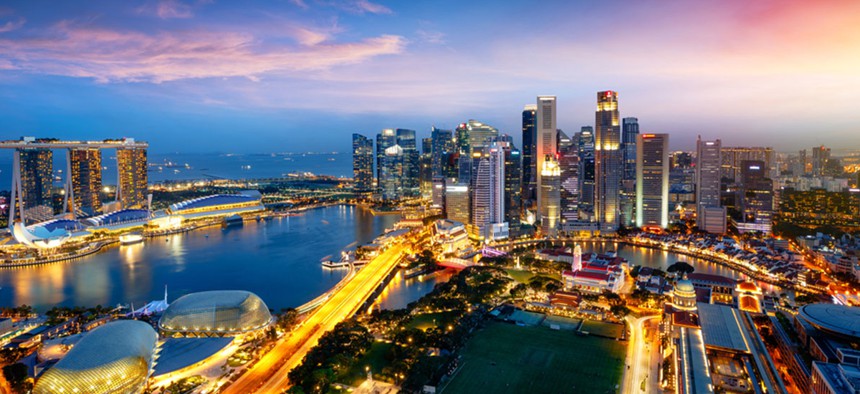
Shutterstock.com
The Perfect Logic Of Holding a U.S.-North Korea Summit In Singapore
Everyone likes Singapore.
The historic meeting between Kim Jong-un and Donald Trump won’t happen in Mongolia or in the austere, scary, super-armed DMZ. It’s set to take place in small, wealthy Singapore.
A city-state island with a population of 5.6 million people, Singapore is the financial center of Southeast Asia. It was the pick of top U.S. officials like secretary of state Mike Pompeo and White House chief of staff John Kelly, as a country that is diplomatically neutral, highly secure, and well practiced at pulling off sensitive events.
The highly anticipated meeting between Kim Jong Un and myself will take place in Singapore on June 12th. We will both try to make it a very special moment for World Peace!
— Donald J. Trump (@realDonaldTrump) May 10, 2018
The U.S. and Singapore have a good relationship
The U.S. and Singapore have had friendly relations for almost half a century. More than 30,000 Americans live in Singapore, 4,200 American businesses operate in the city-state, and the free trade agreement between the two countries supports 215,000 American jobs abroad. The regional headquarters for U.S. companies Airbnb, Google, and Facebook are all in Singapore.
The U.S. is Singapore’s largest foreign investor. U.S. companies have invested more than $180 billion in Singapore, with total investment to the nation reaching $228 billion in 2016. And since signing a bilateral trade agreement in 2004, U.S. and Singaporean trade has increased by more than 60%. The U.S. has a $20 billion trade surplus with the small, Southeast Asian country.
American ships and aircrafts regularly visit the country. The U.S. Navy also has combat ships posted at the Singaporean naval base.
The bottom line: The US and Singapore have a pretty tight-knit relationship.
North Korea and Singapore have a good relationship, too
But Singapore and the U.S. aren’t quite allies, something Chan Heng Chee, the former Singaporean ambassador to the US, is quick to emphasize. “Singapore is not a U.S. treaty ally, unlike Japan, Australia and the Philippines,” she wrote in the Washington Post. “While Singapore has allowed U.S. ships and aircraft usage of some of our military facilities, this is not a reaction to any recent developments. It is an arrangement dating to 1990.”
This stated neutrality is a big part of why Singapore makes sense for the upcoming summit. Talks in the DMZ would have looked conciliatory to North Korea, one likely reason Trump’s top advisors dissuaded the president from holding them there.
Singapore is home to one of North Korea’s 47 embassies. The two countries have had diplomatic ties since 1975, and North Koreans have done business with Singaporeans in the past. Until 2016, North Korean citizens could even enter Singapore without a visa. Singapore, pressured by the US and the UN, did put sanctions on North Korea in 2017, but it has maintained neutral-to-friendly relations with the country.
And Singapore is just 3,000 miles from Pyongyang, which means Kim can fly his private jet to the historic summit without refueling.
Singapore is really good at this
Singapore’s authoritarian government has a proven track record for quickly and safely hosting high-level diplomatic meetings. The island hosted the Association of Southeast Asian Nations summits in both 2007 and 2018. It’s home to an annual international security conference. And in 2009, the country received Obama for his first formal visit as president of the United States. He stayed in one of Singapore’s most upscale hotels, the Shangri-La.
In 2015, Singapore hosted another historic meeting—talks between Chinese president Xi Jinping and Taiwan’s Ma Ying-jeou. They too stayed in the Shangri-La.
Trump and Kim’s upcoming talks on Pyongyang’s nuclear program will be delicate. Conducting them in a neutral country like Singapore, though, signals just how serious both parties are about finding a path to “World Peace.”






